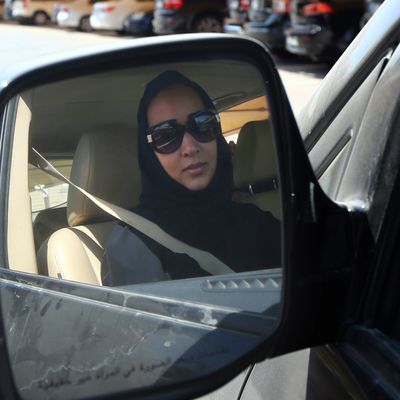
When Saudi Arabia announced on Tuesday that women there would finally be allowed to drive cars starting next June, many women celebrated it as a small but significant victory. The announcement represented the culmination of a nearly 30-year-long campaign by activists to overturn perhaps the most comically absurd of the arch-conservative kingdom’s many restrictions on women’s rights.
Yet at the same time, it also underscored the arbitrary, autocratic, and patriarchal way in which Saudi Arabia is governed. As recently as 2015, women were being arrested, charged with terrorism, and thrown in jail for months for openly defying the ban on driving. Manal al-Sharif, the most famous activist driver, was arrested and jailed for nine days, thrown out of her job, and forced to give up custody of her 6-year-old son for driving in 2011. Chatter and rumors about overturning the ban have percolated for a few years, but by all accounts, Tuesday’s decision took the country by surprise.
What changed between then and now? Nothing, except the minds of two men: 81-year old King Salman, who took the throne in 2015 and reportedly suffers from Alzheimer’s disease, and his 32-year-old son and heir Crown Prince Mohammad bin Salman (MBS), who appears to be basically running the country on his father’s behalf. MBS has taken a number of small steps toward making Saudi Arabia less cartoonishly oppressive in the past two years, taking some power away from the country’s religious police and allowing some popular music concerts and gender-mixed gatherings, alongside an ambitious economic program meant to make the country less petroleum-dependent.
His economic plans and modest loosening of the Saudi state’s infamous vise grip on public morals have earned the prince glowing profiles in the Western media, such as this one from CNN’s national-security analyst Peter Bergen, which reads like it was dictated directly by MBS’s press office and flatters him with such groaners as “there is a new Sharif in town.” Needless to say, MBS’s leading role in Saudi Arabia’s costly and destructive warmongering in Yemen, his defense of its mass executions of political prisoners, and his tendency to have anyone who disagrees with his policies arrested somehow don’t merit mentioning. Nor do such complications appear in this slightly less irresponsible column from April by the Washington Post’s David Ignatius.
MBS, we read in these blandishments, is a bold social and political reformer who’s smart and popular enough to drag his country “kicking and screaming into the 21st century,” as Ali Shihabi, executive director of the Arabia Foundation and a friend of the Saudi elite, put it to Bergen. Scratch beneath the surface of these lauded social reforms, however, and they look more like attempts to burnish the billionaire prince’s own image in the eyes of the world than genuine efforts to better the lives of his subjects.
Reactions to Tuesday’s announcement, for example, were decidedly mixed in Saudi Arabia, where many men have been fed a steady media diet of ultraconservative Wahhabi clerics telling them that women driving would make their wives infertile, turn them into sex maniacs or lesbians, and lead to the deterioration of Islamic values and Saudi society. One of the top trending Twitter hashtags in Saudi Arabia on Tuesday night read, in Arabic: “The women of my house won’t drive.” The hashtag “The people reject women driving” was tweeted 335,000 times, compared to just 33,700 for “The king is victorious for women driving,” the New York Times reported, citing Twitter.
Many Saudi women celebrated, for sure, but the decision was unlikely to make them forget the many rights they still don’t have. Left out of most of the jubilant international coverage of Tuesday’s decision is that the actual parameters of the change have not yet been determined; committee of labor and interior ministry officials will take a month to decide on the final regulations for women driving, which may not give them rights equal to men after all.
And just because women will be allowed to drive, that doesn’t mean they will have access to vehicles. It’s not as though every Saudi woman can go out and buy a car tomorrow: For most women, their finances are controlled by their male guardians, and the men will decide whether or not they get a car. That’s why the auto industry doesn’t expect the new policy to boost sales very much.
Beyond restricting their right to drive, Saudi women’s lives are still controlled by the patriarchal guardianship system in myriad ways: They are not allowed to obtain passports or IDs, and are thus unable to leave the country without their guardian’s permission. Nor are they allowed to get jobs, open bank accounts, open businesses, or decide whom to marry or whether to get divorced without the assent of a male relative. Their testimony is worth half that of a man’s in court, they receive only half as much inheritance as their brothers, and they are unable to obtain custody of their children after a divorce. Saudi women remain legally subordinated to men in nearly every respect, and a driver’s license won’t make them forget that.
The rest of the world, on the other hand, has reacted to MBS’s latest bold move with near-universal approval. Displaying the soft bigotry of low expectations, world leaders and media outlets have heaped praise on the Saudi government for catching up to the 20th century only 17 years into the 21st. So the prince gets to pad his reformist résumé with another dubious credential, then go back to conquering nepotistic worlds with his buddy Jared Kushner and entertaining his fellow plutocrats on his $500 million yacht.
The women, though, know better: They’re aware that this wasn’t entirely about them, and know better than anyone how decidedly unliberated they remain. As professor and women’s rights activist Aziza Youssef put it: “This is a good step forward for women’s rights. It’s the first step in 1,000 miles to go.”





























